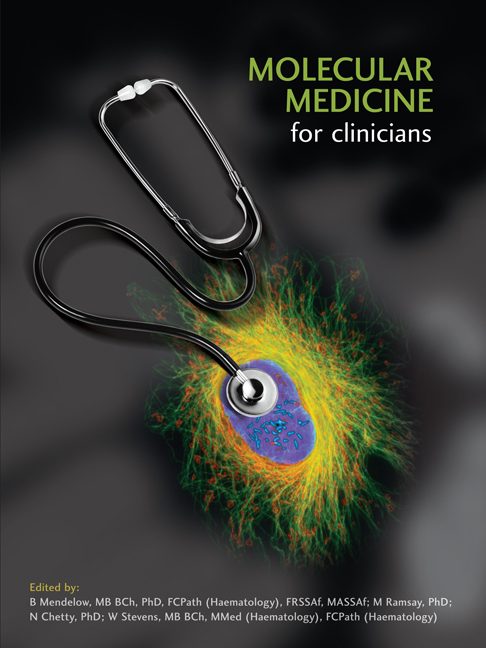Book contents
- Frontmatter
- Contents
- Foreword
- Acknowledgements
- Chapter 1 Introduction
- Keynote Essay 1: Defining Who We Are: DNA in Forensics, Genealogy and Human Origins
- Section 1 Principles Of Cellular And Molecular Biology
- SECTION 2 MOLECULAR PATHOLOGY
- Chapter 8 Genomes and the Environment: An Overview of Molecular Pathology
- Chapter 9 Genetics, Genomics, Health and Disease: General Considerations
- Chapter 10 Chromosome Disorders
- Chapter 11 Mendelian Inheritance
- Chapter 12 Unusual Molecular Processes that Impact on Disease
- Chapter 13 Population Genetics
- Chapter 14 Complex Multifactorial Inheritance
- Chapter 15 Molecular Basis for Phenotypic Variation
- Chapter 16 Medical Genetics
- Keynote Essay 3: Human Cloning: Should We Go There?
- Chapter 17 Neoplasia: General Considerations
- Chapter 18 Oncogenes
- Chapter 19 Mammalian DNA Repair
- Chapter 20 Tumour Suppressor Genes and Inherited Susceptibility to Cancer
- Chapter 21 Carcinoma
- Chapter 22 Leukaemias and Lymphomas
- Chapter 23 Molecular Approaches to the Diagnosis, Prognostication and Monitoring of Cancer
- Keynote Essay 4: Microbes, Molecules, Maladies and Man
- Chapter 24 Molecular Basis of Infectious Diseases: General Considerations
- Chapter 25 Immunology
- Chapter 26 Human Immunodeficiency Virus
- Chapter 27 Tuberculosis
- Chapter 28 Malaria
- Chapter 29 Influenza
- Chapter 30 Oncogenic Viruses
- Chapter 31 Vaccines and Immunisation
- Keynote Essay 5: Drugs and the 21st Century
- SECTION 3 MOLECULAR THERAPEUTICS
- SECTION 4 RESEARCH AND THE CONTINUING EVOLUTION OF MOLECULAR MEDICINE
- Glossary
- Contributors’ Biographies
- Source Material And Recommended Reading
- Permissions And Credits
- Index
Chapter 9 - Genetics, Genomics, Health and Disease: General Considerations
from SECTION 2 - MOLECULAR PATHOLOGY
Published online by Cambridge University Press: 04 June 2019
- Frontmatter
- Contents
- Foreword
- Acknowledgements
- Chapter 1 Introduction
- Keynote Essay 1: Defining Who We Are: DNA in Forensics, Genealogy and Human Origins
- Section 1 Principles Of Cellular And Molecular Biology
- SECTION 2 MOLECULAR PATHOLOGY
- Chapter 8 Genomes and the Environment: An Overview of Molecular Pathology
- Chapter 9 Genetics, Genomics, Health and Disease: General Considerations
- Chapter 10 Chromosome Disorders
- Chapter 11 Mendelian Inheritance
- Chapter 12 Unusual Molecular Processes that Impact on Disease
- Chapter 13 Population Genetics
- Chapter 14 Complex Multifactorial Inheritance
- Chapter 15 Molecular Basis for Phenotypic Variation
- Chapter 16 Medical Genetics
- Keynote Essay 3: Human Cloning: Should We Go There?
- Chapter 17 Neoplasia: General Considerations
- Chapter 18 Oncogenes
- Chapter 19 Mammalian DNA Repair
- Chapter 20 Tumour Suppressor Genes and Inherited Susceptibility to Cancer
- Chapter 21 Carcinoma
- Chapter 22 Leukaemias and Lymphomas
- Chapter 23 Molecular Approaches to the Diagnosis, Prognostication and Monitoring of Cancer
- Keynote Essay 4: Microbes, Molecules, Maladies and Man
- Chapter 24 Molecular Basis of Infectious Diseases: General Considerations
- Chapter 25 Immunology
- Chapter 26 Human Immunodeficiency Virus
- Chapter 27 Tuberculosis
- Chapter 28 Malaria
- Chapter 29 Influenza
- Chapter 30 Oncogenic Viruses
- Chapter 31 Vaccines and Immunisation
- Keynote Essay 5: Drugs and the 21st Century
- SECTION 3 MOLECULAR THERAPEUTICS
- SECTION 4 RESEARCH AND THE CONTINUING EVOLUTION OF MOLECULAR MEDICINE
- Glossary
- Contributors’ Biographies
- Source Material And Recommended Reading
- Permissions And Credits
- Index
Summary
INTRODUCTION
Man has, in a practical sense, applied the principles of genetics to breeding plants and animals since their domestication over 10 000 years ago. Furthermore, the influence of inheritance on disease has been known for about 5000 years and was first recorded in Egypt and later in the Talmud with the documentation of the X-linked pattern of inheritance of haemophilia.
Modern genetics, the science we understand and apply today, was conceived in the controversy initiated in 1859 by Charles Darwin's publication of On the Origin of Species by Means of Natural Selection. By making man part of nature, rather than standing apart and aloof from it, Darwin instigated a religious, philosophical and scientific debate that is still alive today. He also initiated the next half century of research by botanists, zoologists, mathematicians and others in search of evidence to confirm or deny his evolutionary theory. Central to this effort was the development of an understanding of heredity, variation among organisms, and the relationship between them.
regor Mendel's work, published in 1865, was not recognised and appreciated until 1900. Its rediscovery provided a mechanism for inheritance, and with the developing under - standing of genes and the concept of mutation these sources of variation between and within organisms became apparent.
Foremost and early in the field to recognise this was the English zoologist William Bateson. He is considered by many to be the founder of the science of genetics.
In 1905 he proposed the word ‘genetics’ as appropriate for the study of heredity and variation. A year later he repeated his call for the use of the word genetics for ‘the elucidation of the phenomena of heredity and variation’ in the study of evolution and the breeding of plants and animals.
Bateson also realised the importance of Mendel's laws of inheritance to human disease. His collaboration with Archibald Garrod enabled Garrod to propose the autosomal recessive inheritance of alkaptonuria and other inborn errors of metabolism, and establish the relationship between consanguinity and the inheritance of autosomal recessive disorders. Bateson interacted with other clinicians, enabling him to publish a list of single-gene disorders in humans in the 1909 second edition of his book Principles of Mendelian Inheritance. He can therefore also be considered the founder of human and medical genetics.
- Type
- Chapter
- Information
- Molecular Medicine for Clinicians , pp. 126 - 132Publisher: Wits University PressPrint publication year: 2008



